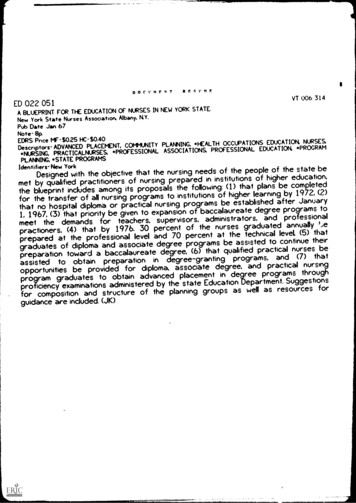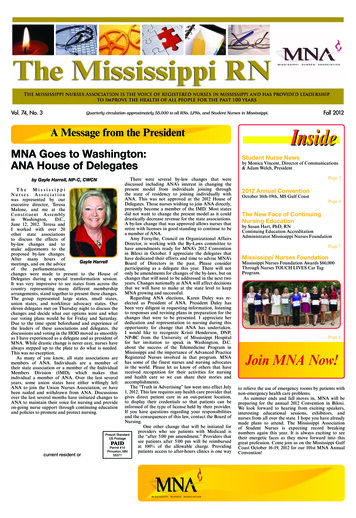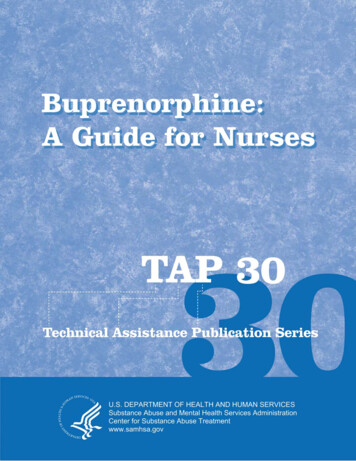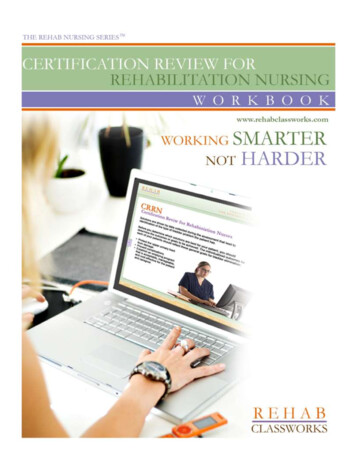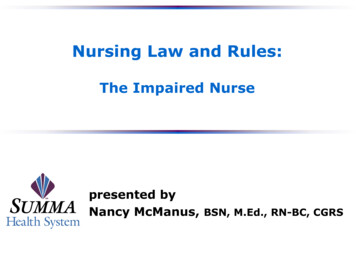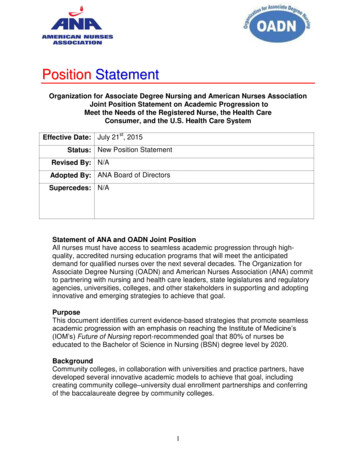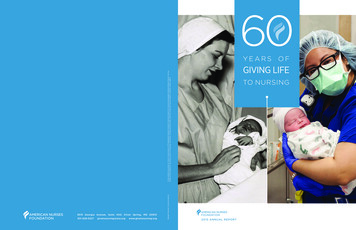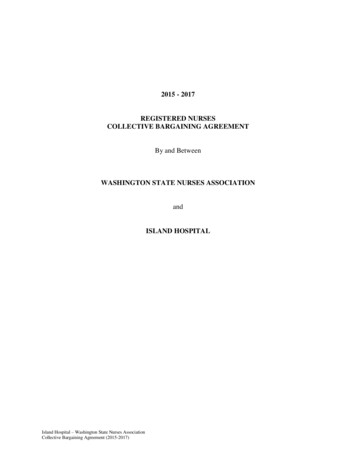
Transcription
EXPLORING NEW NURSES’PERCEPTIONS OF A NURSERESIDENCY PROGRAMbyCHINEDA LASHA HILLNIRMALA EREVELLES, COMMITTEE CHAIRALICE MARCHANDREA MINEARMICHELE MONTGOMERYSTEPHEN TOMLINSONA DISSERTATIONSubmitted in partial fulfillment of the requirementsfor the degree of Doctor of Education in the Departmentof Educational Leadership, Policy, and TechnologyStudies in the Graduate School ofThe University of AlabamaTUSCALOOSA, ALABAMA2019
Copyright Chineda LaSha Hill 2019ALL RIGHTS RESERVED
ABSTRACTHealth care facilities across the United States have implemented innovative approachessuch as nurse residency programs to facilitate a successful transition to practice for new nurses.Many nurse residency programs evaluate their effectiveness by assessing critical thinkingabilities, retention, return on investment, and job satisfaction. Evaluations are conducted usingsurveys and focus groups. However, there is a void in the literature that examines theeffectiveness of a new nurse residency program from the participants’ perspective; particularlyasking the resident how the nurse residency program has advanced them to become a morecompetent professional. The theoretical model framing this investigation is Patricia Benner’snovice to expert theory. The purpose of this qualitative case study is to understand participants’perceptions of a nurse residency program, specifically looking at how the program transitionedthem from advanced beginner to competent nurse professional. The study sample included eightparticipants employed in a health care facility located in the southeastern United States. Openended research questions were designed to elicit the new nurses’ perceptions of the effectivenessof a nurse residency program. Data collection was conducted using interviews and audiorecordings. Emerging themes indicated that pre-experiences and expectations, leadership andprofessional development, stress and coping, supportive cohort, program improvements, andreflection on confidence and competency were fundamental elements for an effective nurseresidency program. One recommendation from this study was for pre-residency assessment toolsto be given to residents for customization to better facilitate the transition of new nurses to acompetent professional.ii
DEDICATIONI want to dedicate this dissertation to the Author of all knowledge and wisdom, my God,and my Friend. Without Him, this would not have been possible.iii
ACKNOWLEDGMENTSMany people need to be acknowledged for the success of this study and the success of myyears as a doctoral student at The University of Alabama. It has taken a collective effort fromsome of the most wonderful people who rallied repeatedly for my success. I am forever gratefulfor all they did for me during this time to make sure I got through to the other side.I need to begin by thanking my chairperson, Dr. Nirmala Erevelles. I could not havegotten through this process without your endless support and tireless efforts to ensure I was onthe right track. It has been an incredible experience. Thank you. Also, I want to thank mycommittee members, Dr. Alice March, Dr. Andrea Minear, Dr. Michele Montgomery, and Dr.Stephen TomlinsonTo my family, there is no way I could ever repay you for hours away from home andstressful moments while I was on this journey. The sacrifices you all made so that I couldcomplete my degree have been tremendous; I am forever grateful to you all.To my son Cameron, I sincerely hope I have made you proud of me; I love you,unconditionally. To my closest friends, you all were my greatest cheerleaders; I love you all.C.L.H.iv
CONTENTSABSTRACT . iiDEDICATION . iiiACKNOWLEDGMENTS . ivLIST OF TABLES . viiiLIST OF FIGURES . ixCHAPTER ONE INTRODUCTION . 1Statement of the Problem . 3Statement of Purpose . 4Research Questions . 4Significance of the Study . 4Overview of Literature . 5Methodology . 6Limitations of Study . 8Delimitations of Study . 8Chapter Summary . 9Operational Definitions . 9CHAPTER TWO REVIEW OF LITERATURE . 11History of Nurse Residency Programs: How we got Here . 12The Benner Effect: Nurse Residency Programs Defined . 15Evaluation of Nurse Residency Programs: Do They Work? . 19v
Gaps in the Literature. 28CHAPTER THREE METHODOLOGY . 30Research Questions . 30Setting of Research . 31Participant Selection and Recruitment . 31Sample Selection . 32Demographic Representation . 33Characteristics of the Participants . 34Methodology Selection . 36Research Design. 36Theoretical Framework . 37Data Collection . 41Data Analysis . 42Accuracy and Credibility . 44Ethical Considerations . 45Researcher Positionality. 46Conclusion . 47CHAPTER FOUR FINDINGS . 49The Nurse Residency Program and Curriculum . 51Themes . 53Chapter Summary . 69CHAPTER FIVE DISCUSSION, RECOMMENDATIONS, AND CONCLUSION . 72Discussion . 73vi
Implications. 80Recommendations . 80Limitations . 81Future Research . 82Conclusion . 83REFERENCES . 84APPENDIX A EXPLORING NEW NURSES’ PERCEPTION OF A NURSE RESIDENCYPROGRAM INVITATION FLYER . 90APPENDIX B INVITATION TO PARTICIPATE IN RESEARCH . 92APPENDIX C DEMOGRAPHIC SURVEY FOR EXPLORING NURSERESIDENCY STUDY . 94APPENDIX D INFORMED CONSENT TO BE IN A RESEARCH STUDY . 96APPENDIX E SEMI-STRUCTURED INTERVIEW QUESTIONS . 100APPENDIX F SAMPLE THEMES AND CODES CHART . 102APPENDIX G NURSE RESIDENCY SCHEDULE . 104APPENDIX H IRB RENEWAL APPROVAL LETTER . 106vii
LIST OF TABLES1. Sample Themes and Codes .442. Sample Session Outline From Nurse Residency Program .52viii
LIST OF FIGURES1. Themes and Categories for Nurse Residency Program Interviews .50ix
CHAPTER ONEINTRODUCTIONNationwide, new nurse graduates’ transition to practice is demanding and overwhelmingdespite ongoing attempts to resolve the problem (Anderson, Hair, & Todero, 2012; Benner,1984; Cho, Laschinger, & Wong, 2006; Goode, Lynn, McElroy, Bednash, & Murray, 2013;Kramer, Maguire, Halfer, Brewer, & Schmalenberg, 2011; Pine & Tart, 2007; Sledge, Potter, &Stapleton, 2016; Thomson, 2011). A negative experience during this transition can delay newnurse graduates reaching their potential to become competent professionals. Those who feeloverwhelmed may leave the profession altogether (Casey, Fink, Krugman, & Propst, 2005), orleave their first job within 1 year of employment (Halfer, 2011). Also, new graduates may faceincreasingly complex practice environments in which patients present with a plethora of clinicaland sociopsychological challenges. The repercussions are already stressed and overworkednursing staff, compounded by a loss of investment made in the preparation of new nursegraduates. To counteract this, attempts have been made to ease the transition by providingstrategies that have a direct impact on increasing confidence and reducing anxiety and stress inthe individual and decreasing turnover rates and improving retention in healthcare organizations.A myriad of strategies to improve the transition process has been reported in theliterature. These strategies range from formal to informal approaches. The formal methodsinclude graduate programs (Anderson et al., 2012), new nurse residency programs (Anderson etal., 2012; Bratt & Felzer, 2011; Cappel, Hoak, & Karo, 2013; Glynn & Silva, 2013), orientationprograms (Guhde, 2005; Strauss, Ovnat, Gonen, Lev-Ari, & Mizrahi, 2016), and nurse1
internships (Beecroft, Kunzman, & Krozek, 2007; Ulrich et al., 2010). An informal approach ismentoring (Del Bueno, 2005; O’Brien-Pallas, Duffield, & Hayes, 2006). Whether formal orinformal, the overarching goal of transition to practice programs is to transition new graduatenurses to fully functioning professional nurses who are comfortable with and satisfied in theirrole as a registered nurse (Keller, Meekins, & Summers, 2006; Thomas, Bertram, & Allen, 2012;Versant, n.d.).A specific strategy that has gained tremendous momentum in the last 15 years is newnurse residency programs (Anderson et al., 2012; Keller et al., 2006). Nurse residency programswere implemented to link the preparation-to-practice gap, improve the expertise of the nursingworkforce, increase safety by decreasing clinical errors, and minimize burnout and turnover innew nurses who may be underprepared. Nurse residency programs have demonstratedeffectiveness in improving clinical competency and communication, as well as retention and asense of belonging, thus resulting in cost savings. Casey et al. (2005) purported turnover in thenew graduate nurse is a documented phenomenon with reports showing that during the 1st yearof practice, 30% to 61% of new graduates change their place of employment. New graduateturnover is costly for health care facilities. A nurse with less than 1 year of experience wholeaves costs the organization nearly 50,000, which is approximately a nurse’s annual salary(Beecroft et al., 2007). Although many have shared the benefits of nurse residency programs(AL-Dossary, Kitsantas, & Maddox, 2014; Anderson et al., 2012; Cappel et al., 2013; Goode etal., 2013), there is a lack of research on structured residency programs’ effectiveness intransitioning a new graduate nurse from advanced beginner to competent nurse.2
Statement of the ProblemMany hospitals across the United States have implemented innovative approaches such asnurse residency programs (NRPs) to assist their new nurse graduates in transitioning to the roleof a competent nurse. The hospital in this study used the University HealthSystemConsortium/American Association of Colleges of Nursing (UHC/AACN) residency program.Over the course of 12 months, each new nurse graduate participated in monthly 4-houreducational sessions that focused on professional development, with an emphasis on criticalthinking in areas such as ethics, patient safety, changing patient condition, quality patientoutcomes, and practicing safe patient care (University HealthSystem Consortium/AmericanAssociation of Colleges of Nursing [The UHC/AACN], 2009). The main objective of thisprogram is to transition the novice nurse from advanced beginner to more competent provider ofcare. To accomplish this, it is essential to evaluate the residency program, as well as evaluate theperceptions and experiences of the participants that have completed the 1-year residencyprogram. There are several studies that have detailed the evaluation of NRPs (Anderson et al.,2012; Beecroft et al., 2007; Casey et al., 2005; Evans, Boxer, & Sanber, n.d.; Glynn & Silva,2013; Sledge et al., 2016; Trepanier, Early, Ulrich, & Cherry, 2012). The studies mainlyresearched developmental characteristics such as competence, confidence, and critical thinkingthat were gained as a result of being in the NRP. Some studies examined retention, recruitment,and turnover rates to evaluate the efficacy of a residency program. However, there is a scarcityin the literature that examines the effectiveness of educational strategies in the UHC/AACNresidency program that support new nurse graduates in their ability to transition into a competentprofessional nurse in a hospital setting from the participants’ perspective.3
Statement of PurposeThe purpose of this research study was to describe and explore the experiences of newgraduate nurses and their perceptions through participation in a 1-year new nurse residencyprogram. Through this study, the various components and pacing of the NRP reflected uponascertaining whether the modules presented were the appropriate tools, education, and support toassist the new graduate nurse in progressing from advanced beginner to a competent provider ofcare. While the nurse residency program that I studied utilizes a survey (Casey-Fink GraduateNurse Experience Survey) for evaluation of the program objectives, I wanted to understandperceptions of the nurse residency program through the nurses’ own voices to dive deeper anduncover their thoughts and opinions. Moreover, in hearing their voices, I wanted to supportnursing practice to identify strengths and weaknesses to potentially improve the nurse residencyprogram.Research QuestionsThis study sought to answer the following qualitative research questions:1. What are the experiences of new nurse graduates completing a nurse residencyprogram?2. What factors do new nurse graduates identify as strengthening their transition intopractice?Significance of the StudyTo meet current and future healthcare needs, it is imperative that evidenced-based nurseresidency programs are developed to prepare novice nurses in delivering safe, competent, andeffective care. To ascertain that these residency programs are well designed to meet the needs ofthe participants, an evaluation process must take place. Using qualitative methods provides the4
researcher with the opportunity to further engage in discussion regarding the NRP. Furthermore,assessing the efficacy of an NRP in a qualitative manner probes new nurse graduates’ thoughtsand feelings regarding specific elements of an NRP. For example, with the UHC/AACN surveycurrently being used to evaluate the NRP, a participant can give their opinion about theeffectiveness of the residency; however, there is no opportunity to get to the “why” of theirassertions about the program. By utilizing qualitative methods, the researcher can gather data onwhich to assess the different components of the nurse residency program to gain a betterunderstanding from the perspective of the participants on the strengths and weaknesses of theprogram. The feedback that is gleaned then can be used to improve the program, nursingprofession, and patient safety.Overview of LiteratureAlthough the volume of literature on nurse residency programs and their effectiveness innursing has multiplied over the last decade, there remains limited empirical inquiry on how newnurse’s perception of a nurse residency program provides support to assist in the transition to acompetent nurse. This is especially true in the United States, where many health careorganizations have implemented transition programs for new graduate nurses (Rush, Adamack,Gordon, Lilly, & Janke, 2013). Nurse residency programs were warranted because nursingacademia and nurse managers in health care facilities both agreed that nursing schools could notfit everything new graduate nurses needed to know to begin a professional nurse career into thelimited clinical opportunities that were available. Additionally, the programs were developed toensure patients remain safe while new inexperienced nurses transition into practice. Valdez(2008) argued that 75% of inexperienced registered nurses did not have acceptable entry-levelclinical judgment skills, and the majority had a hard time translating knowledge and theory into5
practice. Studies have shown that new graduate nurse residency programs are effective transitionto practice programs (Strauss et al., 2016); retain new graduate nurses in their first year ofemployment (Rosenfeld & Glassman, 2016); improve critical thinking, organization, andprioritization skills (Anderson, Linden, & Gibbs, 2009; Bratt & Felzer, 2011; Goode et al.,2013); increase clinical competence and confidence (Welding, 2011); and are a cost-effectiveapproach to decreasing turnover rates among new nurses in the health care setting (Trepanier etal., 2010).The effectiveness of a nurse residency program significantly impacts a new graduatenurse’s job satisfaction, quality of patient care, and patient safety. Research has suggested thatnew nurse residency programs are beneficial to the retention of new nurses (Cappel et al., 2013;Fink, Krugman, Casey, & Goode, 2008; Goode et al., 2013). However, there is too littleinformation in the nursing literature regarding the evaluation of a new nurse residency programand its effectiveness from the participants’ voice. Exploring and understanding how a nurseresidency program facilitates the transition of the new nurse from advanced beginner tocompetent nurse from those who have experienced the phenomenon will inform health careorganizations, academic institutions, and nurse leaders.MethodologyThis research used a qualitative research method. Creswell (2014) recognized thatqualitative research occurs when a researcher exists in the natural setting of the phenomenonbeing studied, collecting data through words, then analyzing them inductively, focusing on themeaning of the participants. Qualitative researchers are concerned with making sense of theirworld and the experiences that arise in the world (Merriam, 2009). Munhall (2012) posited usingqualitative research methods has the capability of freeing researchers from errors and6
preconceived notions, raising understanding, encouraging vocalization, and lifting someresearchers from oppression.A case study research is qualitative in nature and investigates a bounded system (a case)in a specific time frame, by exploring detailed data collection involving several sources ofinformation (Creswell, 2014). Yin (2014) purported a case study design should be consideredwhen (a) the focus of the study is to answer “how” and “why” questions, (b) the researchercannot influence the behavior of those involved in the study, (c) the researcher wants to reportcontextual conditions because of relevancy, or (d) the boundaries are not well-defined betweenthe phenomenon and context. As with most qualitative research whose purpose is to bring forthknowledge about similar patterns and themes within human experience, this process continuedwith the comparison of new interviews until all have been compared with each other. Aqualitative design using a case study method was used to understand the meaning new nursesgive to their experiences after completing a nurse residency program.In this qualitative research, new nurse graduates were chosen using purposeful sampling.Dr. Patricia Benner’s novice to expert theory was used to help frame and organize data tounderstand how new nurse graduates perceive the effectiveness of a nurse residency program.This theory is a highly renowned model which describes five stages through which a new nurseacquires competency and expertise. Dr. Benner introduced the concept that expert nursesdevelop skills and understanding of patient care over time through a sound educational base aswell as a multitude of experiences (Benner, 1984). She further posited that competency innursing practice comes from 2 to 3 years of experience in the same job or role. For this study,the most pertinent principle in Benner’s novice to expert theory was the importance ofexperience. Benner stated that experience in the practice area is required to be an expert in that7
area. Triangulation, member checks, and researcher reflexivity were utilized to support thereliability and validity of this research. Ethical considerations are addressed in Chapter Three.Limitations of StudyDue to this small sample size and subjective nature of the qualitative inquiry, theoutcome of this study may not be generalizable, and assumptions should not be drawn that allnew nurses with the same educational background or that have completed a new graduate nurseresidency program will have the same experiences. However, the study is essential and willprovide support for the findings, which will attempt to record the perceptions of new graduatenurses. Another limitation of this study is the use of purposeful sampling. Purposeful selectionentails deliberately selecting participants for a study that will best help the researcher understandthe problem and the research question (Creswell, 2014). Therefore, due to the nature of thisstudy, participants were chosen purposively and not randomly.Delimitations of StudyThis study has certain delimitations. Most significantly, the participants were new nursegraduates, with less than 2 years of experience in one nurse residency program. The study wasconducted at a community hospital in the Southeast, which may not reflect all institutions withnurse residency programs nor reflect the broader population of community hospitals nationwide.Typical of studies that rely on individuals to volunteer, a selection bias called volunteer bias mayaffect the results. It is possible that the volunteers may, in some way, be different from thosewho did not volunteer to participate in the study and that they may not be representative of theentire population. However, this study will provide robust data from the participants inevaluating a nurse residency program which can have future implications for the nurse residencyprogram in question and the new nurse graduates that participate in the program.8
Chapter SummaryNew graduate nurses’ transition into the practice of nursing has been documented as acomplicated process. The process involved with adjusting to a new role and dealing withpatients who have multiple health conditions are everyday experiences for new nurses. Manyhealth care facilities across the United States have implemented new nurse residency programs tohelp the advanced beginner nurse transition into a competent professional nurse. Few studieshave evaluated a nurse residency program from the participants’ perspective. The purpose ofthis study was to understand better how new nurse graduates experience a nurse residencyprogram. In Chapter Two, I present an introduction to the history of nursing practice and nursingeducation, along with a description of the different significant models of nurse residencyprograms that are available. Also, I introduce an analysis, synthesis, and critique of the relevantresearch literature related to the evaluation of nurse residency programs.Operational DefinitionsAssociate Degree in Nursing (ADN). This is a 2 to 3-year program of study in nursing toobtain an associate degree usually offered at community colleges.Bachelor of Science in Nursing (BSN). This is an academic degree in the science andprinciples of nursing that is granted by a 4-year accredited college or university.New Nurse Graduate. The term in this study refers to a registered nurse who is newlylicensed with less than 6 months to 2 years of nursing experience in clinical nursing practicesince graduation from a school of nursing. Similar terms include “novice nurse,” “nurseresident,” and “neophyte nurse.”Nurse Residency Program. Nurse residency programs (NRP) are structured programsdesigned to orient a new nurse graduate to the professional nursing role. NRPs have planned9
experiences between educational preparation and independent competent nursing practice. Theyfacilitate new nurse graduates to develop clinical knowledge and skills to meet the demands ofprofessional nursing practice. These programs vary in length from 6 weeks to 1 year.Reality Shock. A reaction among new graduate nurses to the nursing profession as theygo through a learning and growing transition.Transition to Practice. The phenomenon of transition to practice is defined in theliterature as the period between being a student nurse and an independent professional registerednurse (Casey et al., 2005; Etheridge, 2007; Keller et al., 2006).10
CHAPTER TWOREVIEW OF LITERATURENurse residency programs have gained popularity in the last 2 decades. The Institute ofMedicine (IOM) described NRPs as “planned, comprehensive periods of time during whichnursing graduates can acquire the knowledge and skills to deliver safe, quality care that meetsdefined (organizations or professional society) standards of practice” (2011, pp. 120-121).According to Letourneau and Fater (2015), new nurse residency programs are supportiveresources designed to facilitate professionalism, along with strengthening clinical skills. In fact,NRPs are orientation programs that can significantly impact the success of the new nursegraduate. They afford the new nurse graduate with support from facilitators, faculty advisors,and other new nurses as they transition into a professional nurse.Additionally, NRPs improve the new nurse graduate’s commitment to the nursingprofession and have increased the overall retention of novice nurses (Fink et al., 2008).Furthermore, NRPs are programs
nurse residency programs (NRPs) to assist their new nurse graduates in transitioning to the role of a competent nurse. The hospital in this study used the University HealthSystem Consortium/American Association of Colleges of Nursing (UHC/AACN) residency program. Over the course of 12 months, each new nurse graduate participated in monthly 4-hour



